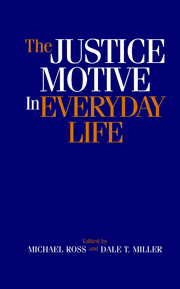Book contents
- Frontmatter
- Contents
- List of Contributors
- Introduction
- Theoretical Perspectives on the Justice Motive
- Victim Derogation and the Belief in a Just World
- The Justice Motive and Prosocial Behavior
- Justice-Based Reactions to Transgressors
- Justice and Reaction to One's Own Fate
- 20 Belief in a Just World as personal Resource in School
- 21 Awaking to Discrimination
- 22 Deservingness and Perceptions of Procedural Justice in Citizen Encounters with the Police
- 23 Fairness Judgements as Cognitions
- Name Index
- Subject Index
21 - Awaking to Discrimination
Published online by Cambridge University Press: 08 September 2009
- Frontmatter
- Contents
- List of Contributors
- Introduction
- Theoretical Perspectives on the Justice Motive
- Victim Derogation and the Belief in a Just World
- The Justice Motive and Prosocial Behavior
- Justice-Based Reactions to Transgressors
- Justice and Reaction to One's Own Fate
- 20 Belief in a Just World as personal Resource in School
- 21 Awaking to Discrimination
- 22 Deservingness and Perceptions of Procedural Justice in Citizen Encounters with the Police
- 23 Fairness Judgements as Cognitions
- Name Index
- Subject Index
Summary
Melvin Lerner's concept of the justice motive has made a major contribution to social psychology. His observations – supported by a raft of elegant experiments – about how people like to think that they are just and like to imagine that they live in a just world have profoundly influenced the shape of social psychology in America. Among the many psychologists to follow the path laid down by Lerner is the first author of this piece, Faye Crosby. Our chapter contains three parts. In the first, we review briefly Mel Lerner's ground-breaking scholarship on “the fundamental delusion,” the need to believe that one's world is fair. The second part of the chapter explores one elaboration of the phenomenon: the denial of personal discrimination. In the second part, we see that people (or at least people in our culture) defend more against recognizing injustices to the individual than against recognizing injustices to groups. People may be particularly resistant to seeing the self as the victim of an injustice. In the final section of the chapter, we peek at preliminary findings of an ethno-methodological study of women who have awakened to discrimination and are now seeking legal means to reestablish justice in their worlds. Throughout the chapter, we see that as the focus of attention (on the self, on another, or on groups) changes, so do the ways that individuals make decisions about justice.
- Type
- Chapter
- Information
- The Justice Motive in Everyday Life , pp. 382 - 396Publisher: Cambridge University PressPrint publication year: 2002
- 8
- Cited by

